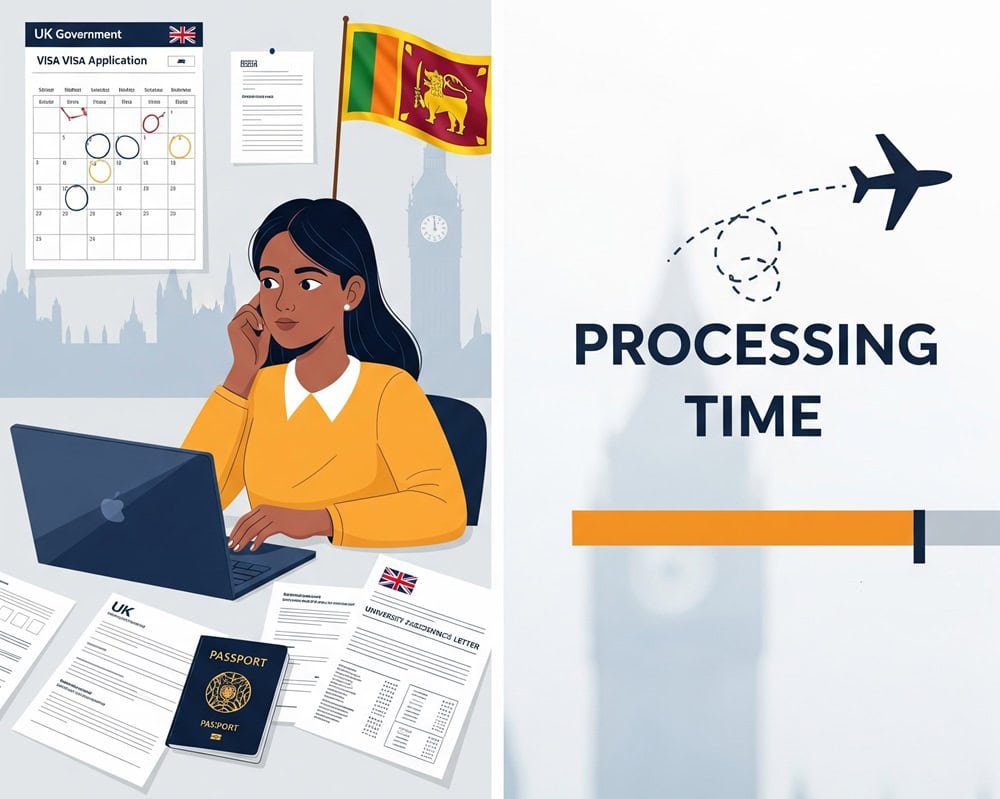So, you’ve decided to chase your dreams of studying in the UK, huh? Well, that’s awesome!
But to be honest, getting your student visa sorted can feel like a bit of a puzzle. Especially if you’re applying from Sri Lanka.
Whereas you might be wondering how long it’ll take, what could speed things up (or slow them down), and whether you’ll have enough time to arrange everything before heading off.
Anyway, you don’t need to worry, though, because we’re going to break it all down for you in this post.
In fact, by the time you’re done reading, you’ll feel way more confident about the whole process.
Table of Contents
ToggleUK Student Visa Processing Time from Sri Lanka
Alright, let’s get into the essential part of UK student visa processing times from Sri Lanka.
Generally speaking, standard UK student visa processing time from Sri Lanka takes around 15 working days.
However, this isn’t set in a confirmed period. Sometimes it’s quicker, sometimes slower, depending on a bunch of factors which we are going to talk about.
On the bright side, if you’re lucky and go for priority services (yes, they exist!), you might get your visa sorted in as little as five working days.
Keep in mind, though, that these timelines are just estimates. Whereas life happens, paperwork gets lost, and delays pop up.
So, the golden rule here is to apply early. Like, really early.
To put it simply, aim to submit your application at least 3 months before your course starts.
Factors Affecting Visa Processing Time
Now, let’s talk about why your visa might take longer or shorter than expected.
To be honest, a lot depends on how smoothly everything goes during the application process.
First of all, how complete your application is makes a huge difference.
For instance, let’s say that you have missing documents. Well, that’s an automatic delay.
Therefore, it’s better to double-check everything before hitting submit.
Then there’s the time of year.
As a matter of fact, peak seasons, like summer and early autumn, see tons of students applying.
Therefore, as a result of it, this can slow things down because everyone’s trying to get their visas at the same time.
Another big factor is where you apply from.
Specifically, in Sri Lanka, applications go through the UK Visa Application Centre in Colombo.
In case their workload is high, you must expect a bit of a wait.
Lastly, personal circumstances matter too.
For example, if you’ve had visa issues in the past, your application might need extra consideration.
So, yeah, it’s not just about filling out forms—it’s about timing, location, and being genuine with your paperwork.
Types of UK Student Visas & Their Processing Times
Not all UK student visas maintain an equal period.
Whereas there are different types, and each comes with its own processing delays.
So, let’s break it down to get an idea of those:
- Student Visa (formerly Tier 4): This is the most common one for students who are heading to the UK for higher education. Regarding the processing period, standard services typically take 15 working days, while priority services can reduce this to 5 working days.
- Short-term Study Visa (Visitor Visa): If you’re only planning to study in the UK for up to six months (or 11 months for English language courses), this visa is for you. Regarding the processing period, it generally also takes 15 working days.
- Child Student Visa: Got kids heading to school in the UK? If so, this one’s for students under 18. In fact, processing times are similar to the regular Student Visa, but additional checks might happen due to the applicant’s age.
Note: The key takeaway here is to select the appropriate visa for your specific situation. That is because applying for the wrong type can cause unnecessary delays—or even rejections. So, double-check the requirements before applying.
Step-by-Step UK Student Visa Application Process
Okay, let’s walk through the actual steps of applying for your UK student visa.
Step 1: Get Your Confirmation of Acceptance for Studies (CAS)
Alright, let’s start at the very beginning.
Before you even think about applying for a UK student visa, you need something called a Confirmation of Acceptance for Studies (CAS).
This is basically an official document from the university or college that you’ve been accepted into.
It’s like your golden ticket or your VIP pass to the UK.
Whereas without it, you can’t move forward with your visa application.
Here’s how it works: Once you’ve been offered a place at a UK institution, they’ll send you this CAS. It contains essential details like your course name, duration, and your personal info. On the plus side, if you receive one, double-check everything on the CAS, as it needs to be 100% accurate, because any mistakes here could cause delays later.
Step 2: Fill Out the Application Form
Now that you’ve got your CAS, it’s time to roll up your sleeves and fill out the online application form.
Don’t worry, it’s not as scary as it sounds.
In this case, students must head over to the official UK government website (GOV.UK) and find the section for student visas.
Next, you need to create an account if you don’t already have one, and then you can start filling out the form.
Now, take your time here, as this is where most people trip up.
To make it fall to the green side, answer every single question honestly and accurately.
That is because even minor errors, like typos or leaving a field blank, can lead to delays or even rejections.
Also, be especially careful when entering your personal details, like your name, passport number, and CAS reference number. As these need to match exactly what’s on your documents.
Pro tip: Keep all your supporting documents with you while filling out the form. This is because you’ll need to refer to them more often, and having them nearby will make the process smoother.
Step 3: Pay the Visa Fee and Healthcare Surcharge
Once you’ve completed the form, you’ll need to pay two things: the visa fee and the Immigration Health Surcharge (IHS).
Speaking of charges, the visa fee covers the cost of processing your application, while the IHS allows you to use the UK’s National Health Service (NHS) during your stay.
Think of the IHS as paying for health insurance, as it’s mandatory, so don’t skip it!
Here’s the deal: The visa fee isn’t refundable, even if your application gets rejected. That’s why it’s pretty important to make sure everything is correct before you hit “submit.” Therefore, always triple-check your application and ensure that you’re ready to go before making the payment.
Step 4: Book an Appointment at the Visa Application Centre
After you’ve submitted your online application and paid the fees, it’s time to book an appointment at the UK Visa Application Centre (VAC) in Colombo.
This is where you’ll go to submit your biometrics, such as your fingerprints and a photograph.
Plus, they might also scan your documents to verify everything.
Anyway, booking the appointment is pretty easy. That is because you can do it online.
However, make sure that you pick a date and time that works for you, and try to book early. Whereas slots can fill up quickly, especially during peak seasons like summer.
With that thought in mind, on the day of your appointment, try to arrive 15 minutes before your given time and bring all your original documents.
This includes your passport, CAS, proof of finances, and any other documents they’ve asked for.
Step 5: Gather and Submit Supporting Documents
This is where things can get a little tricky, but don’t worry, we’ve got you on this as well.
Speaking of which, you’ll need to gather a bunch of supporting documents to prove that you meet the visa requirements.
So, here’s a quick rundown of what you’ll likely need:
- Your valid passport: Ensure it has at least one blank page and is not about to expire.
- Proof of finances: This shows you can afford your tuition and living expenses. Bank statements or sponsorship letters usually work in this case.
- CAS Statement: Print out your CAS and keep it safe.
- Academic certificates: Include transcripts, diplomas, or any other qualifications that have been mentioned in your CAS.
- Tuberculosis (TB) test results: If you’re from Sri Lanka, you might need to take a TB test and include the results.
Step 6: Wait for the Decision
Once you’ve submitted everything, it’s time to sit back and wait.
We know, this is the most challenging part because there’s not much you can do except for tracking your application status online.
Anyway, processing times can change, but as we discussed earlier, it’s usually around 15 working days for standard applications, and if you opt for priority services, you might hear back in as little as 5 days.
Step 7: Collect Your Passport and Visa
Once your visa is approved, you’ll get an email or notification by letting you know.
Then, your passport, along with the visa sticker (called a vignette), will either be delivered to you or available for collection at the VAC.
So, once you get it, check the details on the visa carefully to make sure everything is correct.
In case you spot any mistakes, contact the visa office immediately. This is because it’s easier to fix issues now than after you’ve travelled to the UK.
And that’s it! See? Not so bad, right? Breaking it down step by step makes the whole process feel way more manageable. However, just remember to stay focused, double-check everything, and give yourself plenty of time. That is because you don’t need to get a rejection just because of a silly mistake.
Suggested Reads:
- UK Student Visa Spouse: Requirements, Application Process & Work Rights
- UK Student Visa Requirements For Sri Lanka
- Top Universities in the UK Without IELTS
How to Check Your UK Visa Application Status
Waiting for your visa decision can feel like forever.
Anyway, the good news is that you don’t have to sit around by twiddling your thumbs.
The UK government offers a user-friendly online tracking system to check the status of your application.
Where you just need to log in with your application reference number to get updates on where things stand.
Moreover, some students even get email or SMS alerts if they opt for that service.
So, if you think about it, it’s like having a little window into the visa office’s world.
Note: Just don’t obsessively refresh the page every 5 minutes—that’ll drive you crazy!
Common Reasons for UK Visa Delays & How to Avoid Them
Let’s face it: delays happen.
But knowing what causes them can help you to stay out of trouble.
So, here are some common issues:
- Incomplete Applications: Missing documents or unanswered questions are a red mark. Therefore, always review your application twice before submitting.
- Financial Issues: The UK wants to make sure that you are capable of handling studies and living expenses. In case your or your sponsors’ bank statements don’t meet their requirements, things might get delayed.
- Background Checks: If you’ve travelled to certain countries or have a complicated immigration history, your application might need extra consideration.
Whew, we’ve covered a lot, haven’t we?
From processing times to avoiding delays, you’re now knowledgeable with all the info you need to tackle your UK student visa application from Sri Lanka.
Anyway, remember that the key is to stay on the right track, apply early, and remain calm if things take a little longer than expected.
This is because studying in the UK is a fantastic opportunity, and getting your visa sorted is just the first step.
So, take your time, grab your documents, and get started on your application.
Contact TEVS a UK student visa consultants in Sri Lanka for more details.
FAQs
It typically takes around 15 working days, but priority services can reduce the timeframe to 5 days.
Yes, it does! Priority services can cut the time down to 5 working days.
Use the online tracking system on the VFS Global website with your application reference number.
Delays can happen due to incomplete applications, financial issues, or extra background checks.
Yes, by opting for priority services, which can reduce the processing time to 5 working days.







